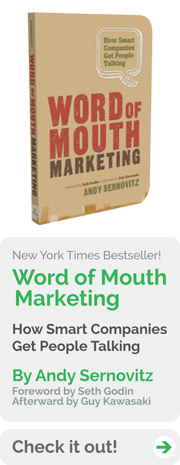3:15 — Andy Sernovitz opens his presentation on social media ethics.
3:16 — Andy: If you’ve ever been to any of our events, you know we always include a lesson on ethics. It’s what we do.
3:17 — Andy: You can’t have any viral success — you can’t have any social media success — without trust being built first. When you hope to get great word of mouth and people find out you cheated, all those people you hoped to talk about you say bad things — and they should.
3:18 — Andy: Ethics is the foundation of a social media program. It’s not what you add later; it’s what everything else is built on.
3:20 — Andy: What we’re talking about is disclosure. All the shilling and sleaziness is a disclosure issue. The good news it that it’s really easy to do disclosure the right way.
3:21 — Andy: For 300 years, advertising and editorial have always been mixed — and that’s OK. It’s all about the phrase: And now, a word from our sponsor.
3:22 — Andy explains that this is not an issue of debate among social media experts, it’s the law. The FTC has made the rules clear, and they will be cracking down.
3:23 — Andy says that there’s nothing new about this idea of disclosure. It’s why we have words like “payola.” Just because it’s social media doesn’t mean you get a free pass.
3:23 — Andy introduces the three things to remember:
- Require disclosure and truthfulness in social media outreach.
- Monitor the conversation and correct misstatements.
- Create social media policies and training programs.
3:24 — Andy explains that the FTC says that if you go out and recruit people to blog for you, you’re responsible.
3:25 — Andy’s personal tips for staying safe:
- Never pay for it — this is where the biggest legal landmines are. Andy: The more important issue is nobody is every going to trust you again. If you find out a company pays for some of their reviews, nobody is going to trust any reviews as being legitimate.
- Disclosure has to be real — it can’ t be hidden or obscure. It has to be completely clear to the average reader, and you’ve got to be 100% strict on this.
- Don’t lie to your mom — the simplest test of whether you’re crossing the line or not is, if your mom were to read a blog post and not understand that it’s an ad, you’re lying to your mother. This is a bad idea, and there will be bigger cosmic consequences for engaging in this type of behavior.
3:27 — Andy explains that disclosure is really easy, and it all starts with the 10 magic words: I work for ____, and this is my personal opinion.
3:28 — Andy’s 3 rules for great disclosure:
- Who are you?
- Were you paid?
- Is it an honest opinion based on a real experience?
3:28 — Andy: The biggest risk of all is a training failure. Companies don’t set out to launch a stealth marketing campaign. The scandals happen again and again from well-meaning executives who just don’t know that it’s wrong — especially from well-meaning junior executives.
3:29 — Andy: It only takes one scandal for embarrassment to hit — and when it does, it’s not the agency that takes the hit – it’s the brand.
3:30 — Andy’s specific steps to do:
1. Create a policy.
2. Create a training program.
3:31 — Andy: The FTC has said that if you have a policy and you train people, you are not responsible for a rogue employee.
3:31 — Andy shows the Disclosure Best Practices Toolkit, created by the Social Media Business Council’s members 18 months ago.
3:31 — Andy: This toolkit is a template that will help you create your own policy. It was 24 companies that worked for months to put all the tough questions out there and figure out how to stay legal, and it’s been through 24 corporate legal teams.
3:32 — Andy: Be careful who you hire. The FTC has said that the brand is 100% responsible for who they hire.
3:33 — Andy encourages brands to meet with agencies to ensure that, in writing, everyone agrees to meet or exceed FTC requirements.
3:33 — We have a chance to do something good, says Andy, as he explains why he does these rants. Andy shows an example – your junk folder in your email, that’s now filled with SPAM, and says email had the chance to prevent it 10 years ago, and didn’t.
3:34 — Andy: We have a chance to make this better. Hold the line on ethics and honesty. Say something when something is wrong. Think about the filth in your inbox any time someone proposes a program that doesn’t seem right to you.
3:35 — Andy: If you don’t buy this high-minded stuff, remember, you’re going to get busted. Save your brand, save your reputation, save your job.
3:35 — Andy says you wouldn’t consider this in traditional media, so don’t risk your reputation or career on it in social media.
3:36 — Andy: By working together, we can keep social media clean, ethical, and honest. It’s good for social media, it’s good for you, and it’s good for your brand.


